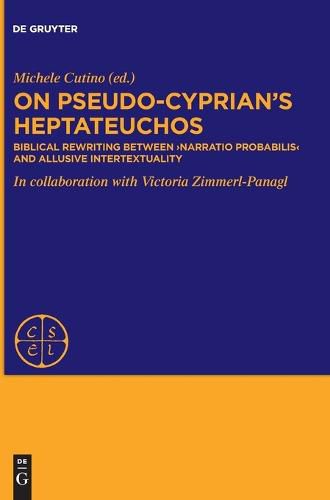Readings Newsletter
Become a Readings Member to make your shopping experience even easier.
Sign in or sign up for free!
You’re not far away from qualifying for FREE standard shipping within Australia
You’ve qualified for FREE standard shipping within Australia
The cart is loading…






This title is printed to order. This book may have been self-published. If so, we cannot guarantee the quality of the content. In the main most books will have gone through the editing process however some may not. We therefore suggest that you be aware of this before ordering this book. If in doubt check either the author or publisher’s details as we are unable to accept any returns unless they are faulty. Please contact us if you have any questions.
Though the Heptateuchos is possibly the most organic attempt at poetic rewriting of the Old Testament, attributed to "Cyprian the Gaul" by R. Peiper, the latest editor of the text in CSEL 23 (1891), we do not have a comprehensive analysis of this poem yet that can provide a clear grasp of the poem's compositional logic, show which of its biblical model's content was used, and expound the context and purpose of its versification. It is apparent that in many respects the Heptateuchos is still profoundly unknown. For this reason the UR 4377 of Catholic Theology and Religious Sciences of the University of Strasbourg, notably its ERCAM ("Equipe de recherches sur le christianisme antique et medieval"), with its statutory members and its associate members, is engaged in the publication of a new critical edition of each of the seven books of the anonymous poem of uncertain date, the Heptateuchos, also providing an exhaustive commentary. The essays collected in this volume represent a preliminary work for the upcoming edition and commentary planned by the members of UR 4377 in Strasbourg. Above all, they show how the anonymous author was interested in safeguarding the criterion of the narratio probabilis in the poem, through probable references to Judeo-Hellenistic literature and by refining the exegetical reading of the text with references to classical and Christian poetry.
$9.00 standard shipping within Australia
FREE standard shipping within Australia for orders over $100.00
Express & International shipping calculated at checkout
This title is printed to order. This book may have been self-published. If so, we cannot guarantee the quality of the content. In the main most books will have gone through the editing process however some may not. We therefore suggest that you be aware of this before ordering this book. If in doubt check either the author or publisher’s details as we are unable to accept any returns unless they are faulty. Please contact us if you have any questions.
Though the Heptateuchos is possibly the most organic attempt at poetic rewriting of the Old Testament, attributed to "Cyprian the Gaul" by R. Peiper, the latest editor of the text in CSEL 23 (1891), we do not have a comprehensive analysis of this poem yet that can provide a clear grasp of the poem's compositional logic, show which of its biblical model's content was used, and expound the context and purpose of its versification. It is apparent that in many respects the Heptateuchos is still profoundly unknown. For this reason the UR 4377 of Catholic Theology and Religious Sciences of the University of Strasbourg, notably its ERCAM ("Equipe de recherches sur le christianisme antique et medieval"), with its statutory members and its associate members, is engaged in the publication of a new critical edition of each of the seven books of the anonymous poem of uncertain date, the Heptateuchos, also providing an exhaustive commentary. The essays collected in this volume represent a preliminary work for the upcoming edition and commentary planned by the members of UR 4377 in Strasbourg. Above all, they show how the anonymous author was interested in safeguarding the criterion of the narratio probabilis in the poem, through probable references to Judeo-Hellenistic literature and by refining the exegetical reading of the text with references to classical and Christian poetry.